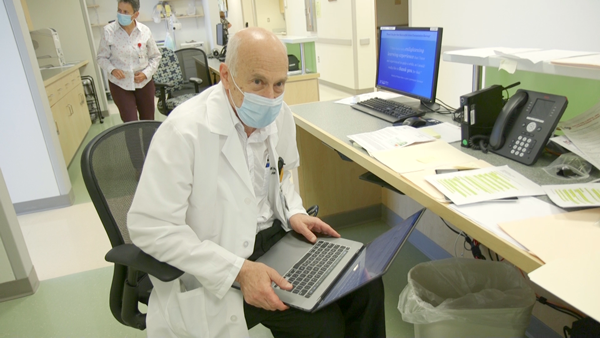The cavalry may be coming, as Anthony Fauci, MD, head of the National Institute of Allergy and Infectious Diseases said recently about safe and effective proposed vaccines to prevent COVID-19. But there are still a few steps before large numbers of people get vaccinated and relatively normal life can be resumed.

Robert W. Finberg, MD, the Richard M. Haidack Professor in Medicine, chair and professor of medicine, and a member of Gov. Charlie Baker’s COVID-19 Vaccine Advisory Group, said the process of getting the population vaccinated will play out in phases over the coming year.
“I think multiple vaccines will be available before summer,” Dr. Finberg said. “By then, we should be at the late phases where we’re vaccinating people who are not at high risk for COVID-19.”
UMass Medical School is participating in Pfizer’s mRNA coronavirus vaccine clinical trial, the first to report results. The vaccine candidate was found to be 95 percent effective with no serious safety concerns reported.
Pfizer and its partner BioNTech filed an application for emergency use authorization of its vaccine with the Food and Drug Administration Nov. 20, potentially allowing the first vaccines to be distributed in mid-December. Moderna, which recently reported similarly high effectiveness rates in its proposed mRNA vaccine, announced Nov. 30 that it was seeking U.S. FDA and regulatory authorization in Europe and elsewhere.
The FDA’s Vaccines and Related Biological Products Advisory Committee is expected to meet publicly on Dec. 10 to review Pfizer’s request and it is scheduled to meet Dec. 17 on Moderna’s application. After the FDA meets, the Centers for Disease Control and Prevention’s Advisory Committee on Immunization Practices will meet. Fairly soon after that, the vaccines should become available.
In a news release, Pfizer said the companies expect to produce globally up to 50 million doses in 2020 and up to 1.3 billion doses by the end of 2021. Moderna expects to distribute around 20 million doses in the U.S. this year and up to 1 billion doses globally in 2021. The companies will be ready to distribute the vaccine within hours after authorization, they say. Two doses, administered a few weeks apart, are required to achieve immunity.
Other vaccines to prevent COVID-19 are also in the works.
The Massachusetts Department of Public Health released an interim COVID-19 vaccination plan in late October, aligned with the CDC’s COVID-19 vaccination program interim playbook and guided by the COVID-19 Vaccine Advisory Group, on which Finberg serves.
Finberg said whichever vaccines the state receives will be administered in three or four phases based on critical need. Highest priority, in the first phase, will be health care providers working with people with COVID-19. As more vaccine becomes available, the second and third phases will likely include adults age 65 or older or adults with diabetes, cardiovascular disease or other underlying conditions that predispose them to severe COVID-19 disease, as well as non-health care essential workers. The last phase will be young adults or children who are not at high risk of severe disease.
Equity has been a big focus among the advisory group, said Finberg. People of color, specifically African American/Black, Hispanic/Latinx, and American Indian and Alaskan Native, have been disproportionately impacted by COVID-19 with higher rates of morbidity, mortality and transmission.
“Both the federal government and the state are committed to providing the vaccine free of charge,” said Finberg. “And we’d like to get it to the communities where there are the most vulnerable populations, certainly including socioeconomically disadvantaged communities.”
DPH’s existing vaccination foundation supports the distribution of millions of doses of vaccine annually to health care provider sites. State health officials are enrolling additional vaccine provider sites to supplement the nearly 3,000 provider sites already registered and reporting immunization data to the Massachusetts Immunization Information System. These include all pediatric provider sites, major hospital systems, community health centers, local health departments and approximately 1,000 retail pharmacy locations.
The state will require all provider sites use purpose-built/pharmaceutical grade units for refrigeration. Some of the vaccines, including Pfizer’s candidate, require ultra-cold storage.
Finberg said logistics are still being worked out, but the Pfizer vaccine requiring ultra-cold storage may be given to hospitals or places where a large number of employees could receive it, while another vaccine may be given to smaller community providers and pharmacies.
Since vaccines in the pipeline require multiple doses, DPH will add text message reminders by February 2021 to the reminder/recall functions that registered vaccine providers already use.
DPH is also developing a communications plan, emphasizing building vaccine confidence broadly among groups anticipated to receive early vaccination and to dispel misinformation about vaccines.
“Getting people comfortable with a vaccine is really, really important,” said Finberg. “Showing that people in health care who are knowledgeable are taking the vaccine and believe it’s safe is going to be very important. The Pfizer and Moderna vaccines have incredible efficacy and actually incredible safety. We need to get that message out.”
Another message Finberg doesn’t want people to forget: “Make sure you get your flu shot.”
Related stories on UMassMed News:
COVID-19 vaccine trial reports high effectiveness; UMass Medical School key enrollment site
LISTEN: Robert Finberg advises ‘Wear your mask, get the flu shot and protect your neighbors’
UMass Medical School announces participation and enrollment for vaccine trial candidate against COVID-19